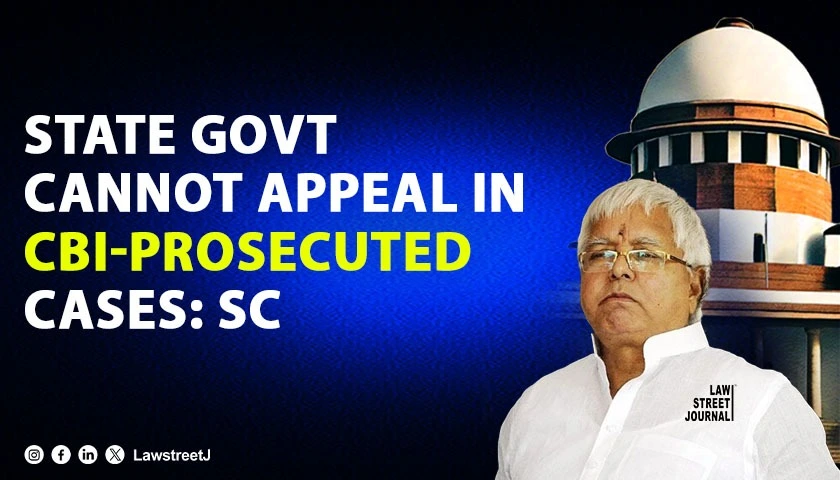New Delhi: The Supreme Court has reaffirmed its landmark judgment in Lalu Prasad Yadav and Anr. v. State of Bihar and Anr. (2010) 5 SCC 1, holding that a State Government cannot file an appeal against an acquittal in a criminal case investigated and prosecuted by the Central Bureau of Investigation. The Court emphasized the mutually exclusive division of appellate authority between the Central and State Governments under Section 378 of the Code of Criminal Procedure.
A three-judge bench comprising Justices Vikram Nath, Sanjay Karol, and Sandeep Mehta delivered this significant ruling while addressing appeals arising from the acquittal of Amit Aishwarya Jogi, son of the then Chief Minister of Chhattisgarh, in a high-profile murder case.
The Court addressed Criminal Appeal No. 1927 of 2014 and connected matters involving the State of Chhattisgarh, the CBI, and Satish Jaggi (de-facto complainant) challenging the acquittal of Amit Jogi in connection with the murder of Ramavatar Jaggi, a National Congress Party leader, on June 4, 2003.
Initially, FIR No. 104 of 2003 was registered by the State Police under Sections 307 and 427 IPC. Dissatisfied with the investigation, the victim’s son requested transfer to the CBI. Through notification dated January 3, 2004, the Chhattisgarh Government transferred the investigation to the CBI, which filed a fresh chargesheet alleging conspiracy involving Amit Jogi and others.
The trial court convicted 28 accused persons but acquitted Amit Jogi on the grounds of insufficiency of evidence. The State of Chhattisgarh filed an application under Section 378(3) CrPC seeking leave to appeal, which the High Court rejected relying on the Lalu Prasad Yadav judgment.
The State of Chhattisgarh, therefore, challenged the High Court’s decision, arguing that since the initial FIR was registered by the State Police and investigation was only later transferred to CBI, the bar on the State Government’s right to appeal should not apply. The State contended this was not a case where FIR was directly registered by the CBI, making it distinguishable from Lalu Prasad Yadav.
Justice Sandeep Mehta, writing for the bench, comprehensively examined the statutory framework under Section 378 CrPC. The Court noted, “The Bench has elaborately drawn distinction in the two enabling provisions, i.e., 378(1) and 378(2) of the CrPC.”
The Bench quoted extensively from Lalu Prasad Yadav, emphasizing, “The opening words—‘save as otherwise provided in sub-section (2)’—are in the nature of exception intended to exclude the classes of cases mentioned in sub-section (2) out of operation of the body of sub-section (1).”
On the core legal principle, the Court reiterated: “The legislature has maintained a mutually exclusive division in the matter of appeal from an order of acquittal inasmuch as the competent authority to appeal from an order of acquittal in two types of cases referred to in sub-section (2) is the Central Government, and the authority of the State Government in relation to such cases has been excluded.”
The Bench held, “Indisputably, applying the ratio of the above judgment, the leave-to-appeal application filed by the State of Chhattisgarh would not be maintainable.”
However, the Court acknowledged a nuanced issue requiring future examination: “In cases like the present one, where at the initial stage the investigation was undertaken by the State Police and subsequently, the State Government thought fit to assign further investigation to the CBI, perhaps the State Government may stake a right to challenge the judgment and order of acquittal on its own.”
The Court left this question open for a suitable case involving specific situations where: (a) the complaint was lodged by the State Government or its officers; (b) investigation was partly done by State Police; (c) prosecution commenced at the State’s instance; (d) the State has a stake in proceedings; and (e) CBI jurisdiction was invoked at the State’s instance.
On the CBI’s delayed appeal, the Court took a pragmatic approach. Though the CBI filed its application 1,373 days late, Justice Mehta observed, “The charges against the respondent, Amit Jogi, were very grave, involving a conspiracy to murder a member of a rival political party.”
The Court held, “We are of the opinion that the High Court ought to have adopted a more liberal and pragmatic approach in dealing with the CBI’s application seeking condonation of delay and should have examined the application seeking leave to appeal on its merits.”
The Bench clarified, “We are not giving any imprimatur to the explanation offered by the CBI in its application for condonation of delay, but our objective is to ensure that the case involving such grave allegations should not be thrown out on mere technicalities.”
On the victim’s appeal, the Court upheld the High Court’s rejection. The de-facto complainant had sought to file an appeal under the proviso to Section 372 CrPC, which came into effect on December 31, 2009, while the acquittal was passed on May 31, 2007.
Citing Mallikarjun Kodagali v. State of Karnataka (2019) 2 SCC 752, the Court held that the victim’s right to appeal “arises only in respect of orders of acquittal passed after 31st December, 2009.”
The Court emphasized, “As on the date of the judgment and order of acquittal, i.e., 31st May, 2007, there was no provision in the statute book which permitted the de-facto complainant to challenge the judgment and order of acquittal.”
Consequently, the Court allowed the CBI’s appeal, condoned the delay, and remitted the matter to the High Court for fresh consideration of the leave-to-appeal application on merits. The State Government’s appeal and the de-facto complainant’s appeals were dismissed.
In an unusual direction considering the significant delay condoned, the Court permitted Amit Jogi an opportunity of hearing in the leave-to-appeal application, noting, “Although at the stage of grant of leave to appeal, the acquitted accused is ordinarily not required to be heard, however, in the peculiar facts of the present case, we consider it expedient in the interest of justice.”
Case Title: State of Chhattisgarh vs. Amit Aishwarya Jogi











